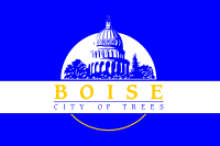Boise Leases Dark Fiber to Consolidate Data Centers
Idaho's capital has begun leasing dark fiber from Zayo Group that will allow it to consolidate a number of data centers it has located in municipal facilities across the city. This will allow Boise to better meet the internal needs of City Departments; the City is not providing access to private businesses or residents.
We tend to focus on how communities have built their own networks to achieve similar ends -- ensuring fast and reliable access to city facilities, including schools and libraries (in fact, we produced a fact sheet about it).
However, long term dark fiber leases achieve some of the same goals and are frequently a far wiser decision that purchasing lit services from existing providers, particularly the national cable or telephone companies.
According to an article covering the story in GovTech,
Rather than subscribing to a service from a local telecommunications company, dark fiber allows the City of Boise access to strands of fiber optic cable between city buildings. In-house network engineers can choose the gear that is used to light the network, while maintaining complete control of protocol, platform and bandwidth, for improved flexibility. Fran Cantwell, an IT project manager for Boise’s Parks and Recreation Department, said that she noticed an immediate improvement using the City’s online mapping system. “Before, staff would wait for the system to slowly paint the screen,” Cantwell said. “After the dark fiber implementation, the maps load almost instantly. This greatly increased the efficiency of teams like Community Forestry, who refer to the maps and aerial photos daily.” The project, launched in June, took about four months to complete. Some city departments have reported a 3,000 percent increase in speed, according to Adam Reno, a Boise IT infrastructure services manager. Transmitting a 30-minute video once took two hours, but can now occur in as little as two minutes.The article provides some details on the cost, saying the City is paying Zayo $500,000 but it does not specify the term of the lease.



